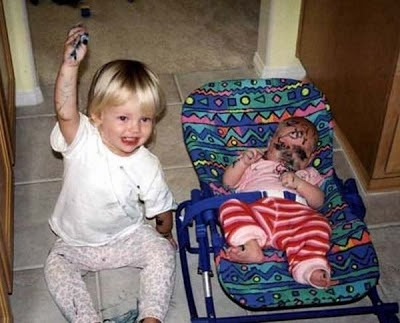According to the Dalai Lama: “The true hero is one who conquers his own anger”. Which is all very well. But then the Dalai Lama doesn’t have a wilfully destructive toddler who’s just smeared half a pot of Sudocream all over the sofa and is now terrorising his younger brother.
Truth be told, fatherhood requires Olympic levels of patience and it can be hard to keep your cool. Personally, I find mornings particularly stressful. The simple act of trying to coax my one and two-year-old sons to eat their breakfast rarely plays out without squabbles, tears, upturned bowls of WeetBix and nuclear-grade tantrums. And my boys don’t behave particularly well either.
The turning point for me came when I found myself on the brink of road-rage, yelling obscenities at a driver who’d just honked at me for no very good reason. As I finished my outburst, I suddenly caught sight of the startled faces of my two boys in the backseat. That’s when I knew I had to tame my temper and set a better example. I don’t want to be the cranky dad who scowls his way through life, punctuating every sentence with “Oh, for fuck’s sake!”
That’s why I sought out anger management specialist Rob McInnes, who runs an online course. Seventy per cent of Rob’s clients do not come to him voluntarily – they’ve been ordered to go by a court after being slapped with a restraining order or following an incident of domestic violence or criminal assault. But even with these serious cases, Rob is confident he can help most people to learn to cage their rage through a technique he’s specifically developed to get fast results. “What I’ve worked out is how to change your habits subconsciously so that you change without even thinking,” Rob says. “I got the idea from hypnosis.”
I had three sessions with Rob and the following tactics have helped me become a bit more Zen and a bit less sweary. The reality is that when you’re wrangling small children, things aren’t always going to be sunshine and rainbows. You can’t stop those mishaps from occurring. But what you can do is learn how to control your response.

Week 1: TRAIN YOUR BRAIN
At our first session, Rob gives me a simple mantra to practise. “Say these five words: ‘Stop. Find calm. Big picture’,” he tells me.
“Don’t think about what you’re saying. Just keep repeating it. It is a mantra, not positive thinking. The phrase is a direction from the conscious mind to the sub-conscious mind.”
I’m instructed to say this mantra for five minutes, everyday for a week while doing a low-level physical activity like walking, driving or vacuuming. Truth be told, I’m pretty sceptical of all this. But I keep repeating it to myself when I’m rocking the baby, washing the dishes or mowing the lawn. Stop. Find calm. Big picture.
Miraculously, after a few days, it seems to kick in. One day, for example, when I get a parking ticket, I still feel that familiar surge of blinding rage that makes consider aiming at a karate kick at my wing-mirror. But then “poof!” … somehow it magically disperses. It’s like my anger has been short-circuited before finding expression. My sub-conscious is apparently retraining my brain to be marginally less of a prick.

Week 2: PLAY THE BALL
As Rob is based in Melbourne, the conversation with thudding inevitability turns to AFL.
“When you watch good footy players, they’re focused on the ball,” he says. “That’s how they can best influence the course of the game. Bad players that don’t have any skill? They’re forced to resort to going for the man instead.”
Rob wants me to apply this same principle to those tinderbox situations that threaten to ignite a flare-up. I need to focus on the mechanics of the problem rather than taking a verbal (or actual) swing at the perpetrator. “Separate the behaviour from the person,” he says. “That way you’re focused on finding a solution.”
The next day, we’re running late for an open-house inspection. My son has got a stinking cold and hasn’t slept well (AKA he’s being totally impossible). He keeps running away when I try and get him dressed and when I finally pin him down he arches his back and then accidentally head-butts me flush on the nose.
I shut my eyes and take a deep breath.
Playing the ball here, I realise, simply involves trying to calm my son down enough that I can get him dressed and we can leave the house. He hasn’t been demonically possessed – he’s just over-tired and unwell. Focus on the problem.
I scoop him up and carry him into the garden where we take a look at the magpies in the tree and his mood quickly brightens. A minute later, he’s happily submitting to his change of clothes and we’re soon in the car and heading to our destination. Playing the ball has led to a well-worked goal.

Week 3: CHECK YOUR HEAD
When faced with any new situation at work or play, Rob wants me to practise asking myself the question: “Who am I now“.
“Ask yourself whether you’re solving the problem as a father, employee or a friend. Once you are focused on who you are, then you can focus on what you want and how to get it.””
This is the final piece in Rob’s tool-kit – basically a mindfulness tactic for hot-headed loons. The idea is to retune your mental antennae to synch with your current situation. When you get into work, for example, your answer to the question might be: “I’m a team leader”. Rather than, say, a disgruntled commuter still raging because your train was 25 minutes late.
By adjusting your mindset to the task at hand, the aim is to park your ancillary problems to stop them infecting your new scenario. Make an effort to keep your head in the game that you’re actually playing, Rob suggests. “Try to focus on the present.”
That night, I ask myself that question at work as I’m pulling up at home. It hasn’t been a productive day and I’m struggling to meet a scary deadline. Mentally, I make a conscious decision to put my stress on hold – I’ll pick up the work later once the kids are in bed. Right now, I need to be a calm dad and an attentive partner.
I take a deep breath, walk into my house and brace myself for the ear-splitting chaos of bathtime.
Check out Rob McInnes online anger management course: here
